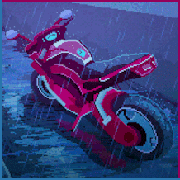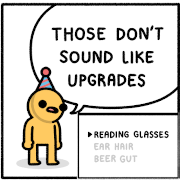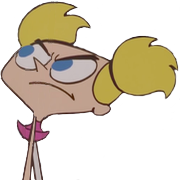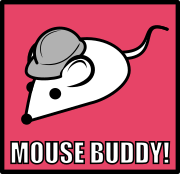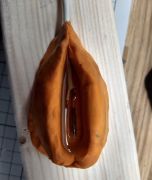|
Supradog posted:What ARE you talking about? Hey man, nobody's freaking out here. I was trying to solve why my chain needed adjustment every 400 miles, answer being I made a stupid assumption early on and it wasn't an O-ring chain. My next plan is indeed to buy a DID 520VX3-110 steel X-ring chain off of Amazon and figure out how to remove or cut off the old one, which shouldn't be hard. I wasn't really planning at this point to change the sprockets, because I assumed the "replace them as a set" advice is based on longer-life O-ring or X-ring chains, and not this failchain on sprockets that only have 1700 miles on them and don't really show any significant signs of wear. Remy Marathe fucked around with this message at 00:46 on Aug 7, 2022 |
|
|
|

|
| # ? May 16, 2024 08:36 |
|
Cheap bikes tend to come with cheap sprockets, have a look at the tooth profile on the front especially and replace them if they're at all asymettric or they'll just nuke your nice new chain.
|
|
|
|
|
Also, unless you're changing sprocket sizes, stick with OEM sprockets. My first bike was a 98 TW200. I replaced chain and sprockets with aftermarket. The aftermarket sprocket must have been harder than the output shaft, because the splines on the inside of the sprocket wore off the splines on the output shaft. So, in the middle of traffic I went to let the clutch out and got a jingling noise as the shaft spun around inside the sprocket. Once home, I had to pull the motor and have a shop split the cases and replace the main/output shaft. Was it possibly a fluke where the output shaft hadn't been tempered or something? Maybe. Will I ever run that risk again? Never.
|
|
|
|
Slavvy posted:Cheap bikes tend to come with cheap sprockets, have a look at the tooth profile on the front especially and replace them if they're at all asymettric or they'll just nuke your nice new chain. Extend the life of your sprocket by flipping it over now and then to keep the wear symmetric. In seriousness, is there really any reason not to change at least the front sprocket together with the chain (even if a sprocket is supposed to last a few chains)? On both the bikes I've bought used the chain and front sprocket came pre-worn, and on one of them the front sprocket nut was stupidly hard to get off (probably took something close to 500Nm / 400 torques). Assuming that doesn't happen too often (and it hopefully shouldn't since I do torque wrench), changing the sprocket itself is less effort than riveting the new chain, about 20% the price, and sold at the same place. Captain McAllister posted:Was it possibly a fluke where the output shaft hadn't been tempered or something? Maybe. Will I ever run that risk again? Never. Only good reason I can think of for that happening is if the nut has come loose enough for the sprocket to wiggle about. That could over time be able to destroy parts of just about any quality. While talking front sprockets, what about those rubbed-damped ones? I guess it's supposed to make the chain "land softer" on the sprocket and avoid some metal-on-metal noise. On both aforementioned bikes, through ignorance I managed to order whatever wasn't on it (a Versys 650 that came with a rubber one, an SV650 that didn't, and I replaced them with a new "the other kind" JT sprocket). I can't honestly say I noticed a difference in either direction. The Versys had a badly worn chain and shark tooth front sprocket that made quite some noise as it was, and maybe it just got replaced with a slightly different kind of much less annoying noise. On the SV650 stuff was less worn to begin with, didn't make any annoying noises before or after, and I just can't notice any difference to the general "chain noise".
|
|
|
|
ionn posted:Extend the life of your sprocket by flipping it over now and then to keep the wear symmetric. The non-joke version of this trick is: next time you buy a chain and sprocket set, buy two extra front sprockets. Swapping the front every 5-10k when the teeth get weird is much less of a pain than you'd think, especially when you were the person who put the last one on, and doing so can boost the life of the chain significantly.
|
|
|
ionn posted:Extend the life of your sprocket by flipping it over now and then to keep the wear symmetric. I've never been able to tell the difference between a rubber sided and plain sprocket noise-wise. I think the ratio of chain to sprocket wear is super dependant on the size and power and general usage of the bike even if you're super anal about chain maintenance.
|
|
|
|
|
I go through chains pretty quickly. I got the chain replaced twice in the 20.000km (5 years) that i have the SV now, which i think is really quite fast. I keep them well lubricated, pretty much once every tank and a half of fuel (or earlier if it rained and the rollers start to look shiny/not covered with some lube) I don't often clean them though. Even though the sides of the chain get mucky, the surfaces where the rollers contact the sprockets are always clean (except for a layer of chain lube). My garage suggested that riding in winter with salt on the roads (something i do fairly regularly) is the cause of the fairly rapid wear. Idk, sounds like it could be. Or is cleaning *that* important?
|
|
|
|
Eliminate the boring maintenance crap to do with chains and carbs; get a belt or shaft driven bike, with EFI.
|
|
|
|
Steakandchips posted:Eliminate the boring maintenance crap to do with chains and carbs; get a belt or shaft driven bike, with EFI. Never. Chains and lifetimes have this matrix that they work on. Some of it is environmental in the running conditions they see. Some of it is user care and how often, how clean, and the lubes involved. Some of it is the gearing. More teeth or less power, less stress on the links and pins. Some of it is the materials in the chain itself. And of course. black arts. cursedshitbox fucked around with this message at 16:13 on Aug 7, 2022 |
|
|
|
Renaissance Robot posted:The non-joke version of this trick is: next time you buy a chain and sprocket set, buy two extra front sprockets. Swapping the front every 5-10k when the teeth get weird is much less of a pain than you'd think, especially when you were the person who put the last one on, and doing so can boost the life of the chain significantly. What I've seen on an internet said a sprocket should last a couple of roller chains (and that the chain really starts eating the sprockets, especially the front, once it starts getting stretched). But given the cost&effort of the things, if early sprocket changes can actually make the chain last a bit longer it would totally be worth it. Steakandchips posted:Eliminate the boring maintenance crap to do with chains and carbs; get a belt or shaft driven bike, with EFI. I'm happy to deal with chains, but avoid anything with carburetors like the plague other than maybe lawnmowers, chainsaws and such. And dear lord save me from ever having to deal with a multi-carb engine. Met a guy a few weeks ago who had a custom-built weird looking bike with a Honda CBX engine in it. It was bored out to 1.3L and he had just put nitrous on it. Dude was nice and chill, but was probably mad in more ways than one. 6 goddamn carbs, to me that is at least 5 too many.
|
|
|
LimaBiker posted:I go through chains pretty quickly. I got the chain replaced twice in the 20.000km (5 years) that i have the SV now, which i think is really quite fast. Yes cleaning is that important. Steakandchips posted:Eliminate the boring maintenance crap to do with chains and carbs; get a belt or shaft driven bike, with EFI. Unironically agree with the last part. Almost no bike needs a chain, belt drive would work perfectly for 90% of the machines out there. Just like everything should have a center stand.
|
|
|
|
|
Ideally one that doesn't touch down before the pegs on one side. and OK I'm fully sold on preemptively doing the front sprocket and maybe the back when I get to it, didn't realize they were reasonably cheap.
|
|
|
|
That is a good question, I get why belts seem good for the cruiser market, since they likely would have pretty terrible wear and slip risks on sports bikes. And I want to assume that shafts aren't used because of weight concerns and the added cost? Why are chains and sprockets the primary thing on basically any bike that isn't a cruiser or touring bike?
|
|
|
UCS Hellmaker posted:That is a good question, I get why belts seem good for the cruiser market, since they likely would have pretty terrible wear and slip risks on sports bikes. And I want to assume that shafts aren't used because of weight concerns and the added cost? Why are chains and sprockets the primary thing on basically any bike that isn't a cruiser or touring bike? It's How We've Always Done It. Belts are more efficient, quieter, cleaner. But they are vulnerable to stones and things, so that rules them out of dirt, and they don't allow for quick and easy ratio changes + fail catastrophically instead of gradually, so that rules them out of sport. I suspect a small chain is actually cheaper to make than a belt because the tooling was paid for somewhere around world war one. Shaft drive is as you say, heavy and inefficient so you only find it on big chonkers.
|
|
|
|
|
Is the current F750GS a through line from the 2008 dual-800 confusingly named F650GS? It’s surprisingly hard to understand BMW’s range and their evolution. E: I mean, difficult for me, maybe it’s super obvious to everyone else.
|
|
|
|
My go-to mechanic just said I should be putting premium gasoline in my 2016 Yamaha SR400 (yes I am an idiot for owning this bike). He is super knowledgeable and has always helped me out at almost outrageously low prices so I like and trust the guy a lot but this seems to make no sense to me. But he said the bike will run better and more efficiently...
|
|
|
|
It wont, you’re right in this one
|
|
|
|
Yeah my yamaha manual says "Your Yamaha engine has been de-signed to use regular unleaded gaso-line with a research octane number of95 or higher. " I have no idea where to even find 95 wtf
|
|
|
|
Kwolok posted:My go-to mechanic just said I should be putting premium gasoline in my 2016 Yamaha SR400 (yes I am an idiot for owning this bike). He is super knowledgeable and has always helped me out at almost outrageously low prices so I like and trust the guy a lot but this seems to make no sense to me. But he said the bike will run better and more efficiently... Octane rating means how compressible the gasoline is. Higher compression ratio means you need higher octane. Running higher than necessary doesn’t give you more power or better fuel economy or whatever. Calling it “premium” is just dumb marketing. Although I guess it may be true that 91 might have some detergents and stuff in it that 87 won’t. Kwolok posted:Yeah my yamaha manual says "Your Yamaha engine has been de-signed to use regular unleaded gaso-line with a research octane number of95 or higher. " I have no idea where to even find 95 wtf
|
|
|
|
US octane ratings are about 5 points lower than Japanese/Europeans for the same fuel due to different definitions. https://en.m.wikipedia.org/wiki/Octane_rating Very confusing if manuals are not localized properly
|
|
|
|
Ah so if that is true my manual does in fact recommend 91... odd.
|
|
|
Kwolok posted:Yeah my yamaha manual says "Your Yamaha engine has been de-signed to use regular unleaded gaso-line with a research octane number of95 or higher. " I have no idea where to even find 95 wtf 95RON is your 'premium' yeah. The reason Yamaha will spec it is because modern riders are largely mechanical idiots and the bike is an air cooled from the 80's - higher octane number will reduce the chances of detonation if you get the bike insanely hot by eg riding start-stop traffic in first gear for hours, that kind of thing. The compression ratio and general tune of the bike certainly don't demand it 99% of the time, it's a CYA thing.
|
|
|
|
|
The VanVan's calls for 91 octane too, I feel suspicious every time I fill up, but the FSM and OM agree and I am not a chemical scientist. e; ^^^^^^^ ah, that's an explanation.
|
|
|
|
I always just put 87 (US octane) in my MT03. Weirdly the time i put 93 in the bike, i got like 10 mpg worse for that tank with about the same riding style. Don't really want to try it again to see if it was a weird fluke.
|
|
|
|
Higher octane = less volatile, afaik if you haven't got the compression to take advantage then you're just getting less bang for your buck. I'm not a chemist though.
|
|
|
|
|
That makes no sense indeed. The only thing that to my knowledge can reduce your fuel economy, is the addition of ethanol. This is because ethanol contains less energy per liter, so for the same power you need more fuel. But because usually it's only 10% ethanol the effect will be very small. The reason why i use non-ethanol or low-ethanol fuel, is because both my bikes are kinda old and filled with rubber bits that are probably already in their golden years, and adding ethanol will only accelerate that problem. A liter of gasoline contains 2 times the energy (about 45MJ) ethanol contains (about 20MJ). When you run e85 or only ethanol, this is a very important difference. Ethanol has a very high octane number so you can increase compression a lot, but you also need much more of it. Put E85 in a normal bike and it'll probably run, but you'll be down on power because your jets or injectors don't nearly put enough fuel into the mix as they should. There are two things that radically affect my fuel economy, and that's highway riding with a headwind, with a floppy rain suit - and strugging with carb freezing in the fog in winter, while running half the within-a-city trip on choke because it's so bloody cold and the engine doesn't heat up that fast. Besides those situations i'm very consistently getting 1:17 to 1:19 per tank on the SV, or between 5 and 6l/100km. Getting RON95 in Belgium and Germany didn't have any difference at all, compared to RON98 (both <5% ethanol). Never tried the 10% ethanol stuff. LimaBiker fucked around with this message at 09:18 on Aug 12, 2022 |
|
|
|
Those are all very good points but I talked to my stock broker today and he told me to tell you all to continue putting premium gas in your bikes.
|
|
|
|
some kinda jackal posted:Those are all very good points but I talked to my stock broker today and he told me to tell you all to continue putting premium gas in your bikes. Your stock broker must also have 12.3:1 compression.
|
|
|
|
Upon returning from a 30 minute ride, I noticed my rear brake rotor was burning hot, couldn't touch it for more than a second. Both front discs were barely warm. If I'm using the rear brake, it's together with the front, or in low-speed situations. Is this pointing me towards something wrong with the master cylinder, or the caliper/pistons, or the pads? Not sure in which order to attack this.
|
|
|
|
It's likely dragging, exactly what my FZR600 did. If you cannot rockit back and forth with a few fingers, or if it doesn't roll away when you're on a very slight incline, it's dragging too much. If it's dragging, there can be multiple causes: - Worn or swollen rubber seals in the calipers - Plugged return passage in the master cylinder - Worn/swollen rubber seals in the master cylinder - Swollen rubber brake lines. It's hard to diagnose what exactly is the cause without just doing all of it. The easiest thing to diagnose is the return passage. Follow the little hose that goes from your fluid reservoir into the master cylinder. Take it off (take care not to spill brake fluid on painted surfaces, it will damage the paint!), and you'll see a big hole and a very small one. Make sure the very small one is open. If you pry the brake pads apart so brake fluid flows back from the pistons to the master cylinder, some fluid should come out of it. Perhaps poke something into it. If it's clogged and you just unclogged it by poking it through, you kinda wanna flush out your whole system to prevent it from clogging up again. If you see any kind of dirt, gel or flakes in the hose or in the master cylinder, you have to take apart the whole system and clean everything. In my case, everything *was* clean except for that exact part, and that just kept releasing particles and flakes until i cleaned it out. Also there was a ton of rust behind the dust boot of the master cylinder. Cleaned that up too. In a lot of cases, the rubber seals in the caliper are the culprit. They're not too hard to replace. Just take care, if you use air pressure to pop the pistons out you gotta wrap the caliper with piston in a rag to prevent the 4 or so bar of air pressure to make the piston fly across the workshop. The master cylinder usually isn't the culprit, so you could start with first checking the return passage, and then the caliper seals. If that doesn't fix it, master cylinder and (if rubber) brake line.
|
|
|
|
interestingly my local gas station is one of the few in the state that offers ethanol free gas but apparently you aren't allowed to use it on the street due to lack of oxygen? content??
|
|
|
|
|
A MIRACLE posted:interestingly my local gas station is one of the few in the state that offers ethanol free gas but apparently you aren't allowed to use it on the street due to lack of oxygen? content?? Who's going to check?
|
|
|
|
In southern Ontario at least, Shell premium is ethanol-free, so I use it as the last fill up before winter storage.
|
|
|
|
Chris Knight posted:In southern Ontario at least, Shell premium is ethanol-free, so I use it as the last fill up before winter storage. 
|
|
|
|
I found ethanol free gas down in Tombstone yeeehaww cowboy.
|
|
|
|
Chris Knight posted:In southern Ontario at least, Shell premium is ethanol-free, so I use it as the last fill up before winter storage. Oh I never thought about this, that’s a good tip. Thanks!
|
|
|
|
I use regular 95 euro octanes e10 as per the manual but last few fillups at the end of last season I splurged for 98 e5 that can still be had and one gas station chain - not for the octane rating but the lower ethanol content. Probably made no difference except a few wasted monetary units and peace of mind I'd done what I could. I'll probably do the same again this fall. All small carburated engines in my life run fancy alkylate fuel which is very stable and don't gum up the carbs so that's nice. A bit pricy to run in a motorcycle though.
|
|
|
|
TotalLossBrain posted:Who's going to check? *cop takes out a long stainless steel straw, takes a sip of your fuel and writes you a ticket*
|
|
|
|
Chris Knight posted:In southern Ontario at least, Shell premium is ethanol-free, so I use it as the last fill up before winter storage. Enjoy while it lasts An email reply I got from Shell last fall posted:For BC the 10% ethanol in Shell V-Power NiTRO+ will be the new norm for the Lower Mainland/Lower Fraser Valley & Vancouver Island orbits. Both regions will have 10% ethanol by year-end in all grades of gasoline: Lower Mainland/Lower Fraser Valley by the end of October, and Vancouver Island by December. These changes to ethanol content are driven by the BC Low Carbon Fuel Requirements and need to reduce the carbon intensity of fossil fuels, which ethanol is one mechanism to reduce carbon intensity. Same for Alberta and Manitoba so far. If you see the label at the pump “Gasoline may contain up to 10% Ethanol” this is already happening.
|
|
|
|

|
| # ? May 16, 2024 08:36 |
epswing posted:Upon returning from a 30 minute ride, I noticed my rear brake rotor was burning hot, couldn't touch it for more than a second. Both front discs were barely warm. If I'm using the rear brake, it's together with the front, or in low-speed situations. Is this pointing me towards something wrong with the master cylinder, or the caliper/pistons, or the pads? Not sure in which order to attack this. It's a sportster right? Try getting the back wheel up and seeing if it turns freely, or you might be able to notice the bike being a bit harder to push around. Not much it can be besides a stuck caliper piston or the brake lever constantly applying a bit of pressure, if you've got the kind with a free play adjuster, that might be wound too far and causing a little drag. Also check your rear wheel is aligned straight.
|
|
|
|


















